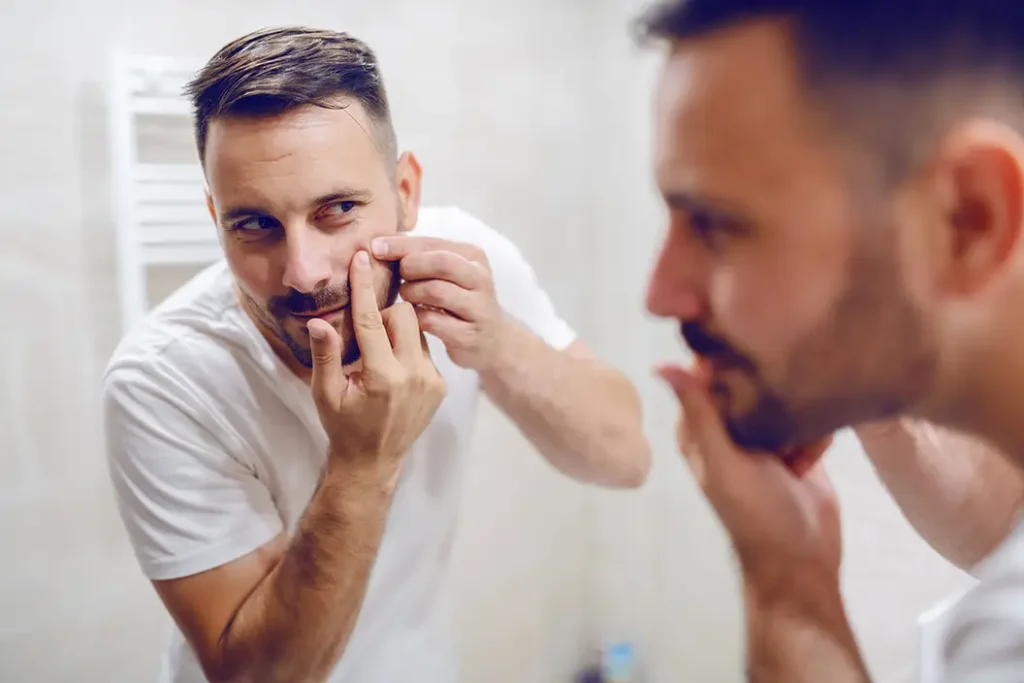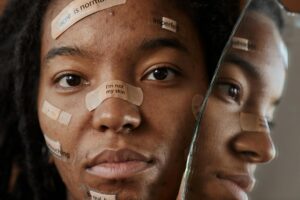Some believe that the sun can dry out acne and improve its appearance, but does this actually work? Let’s take a closer look at what the science and experts say about tanning and its effects on acne.
Why Do People Think Tanning Helps with Acne?
This belief that tanning gets rid of acne stems from three primary factors:
- The Drying Effect of the Sun: Sunlight dries out the skin’s surface, including sebum, the oily substance produced by the sebaceous glands. By reducing the amount of visible oil, sun exposure can temporarily make acne look less prominent, leading to the misconception that it’s an effective treatment.
- Association with Blue-Light Therapy: Blue-light therapy, which is a dermatologist-recommended treatment for mild to moderate acne, has shown positive results. It uses a specific wavelength of light to target acne-causing bacteria. Because of this, many assume that natural sunlight, which contains some blue light, might offer similar benefits. However, the type of light used in blue-light therapy is much more targeted than the broad-spectrum light provided by the sun.
- Tanned Skin Masks Pimples: A tan can make the skin appear more even-toned, which may temporarily hide acne lesions and red marks. For many, this creates the illusion that their skin is clearer after sun exposure, even though the underlying acne remains.
The Long-Term Effects of Tanning on Acne
While sun exposure might provide short-term relief, it’s important to consider the long-term consequences. Prolonged exposure to UV rays can actually make acne worse and contribute to other skin issues.
- Increased Oil Production: The sun’s drying effect can trick the skin into producing more oil. As the outer layer of the skin becomes dehydrated and thickened from UV exposure, the body compensates by increasing sebum production, which can clog pores and lead to more breakouts.
- Risk of Hyperpigmentation and Scarring: UV rays can exacerbate post-acne marks and scarring. The sun’s rays stimulate melanin production, which may cause acne scars to darken, leading to hyperpigmentation that takes much longer to fade. For individuals with acne-prone skin, excessive sun exposure can worsen scarring rather than heal it.
- Premature Aging and Skin Damage: In addition to worsening acne, sun exposure accelerates skin aging. Wrinkles, fine lines, and sunspots can develop more quickly due to UVA and UVB rays, making the skin look older and less vibrant over time.
Indoor Tanning: A Dangerous Alternative
Some people turn to indoor tanning as a means to clear up acne, but this is not only ineffective, it can even be dangerous. The misconception that indoor tanning is safer than natural sunlight persists, even though both expose the skin to harmful ultraviolet (UV) radiation.
- Increased Risk of Skin Cancer: Indoor tanning significantly raises the risk of skin cancer, particularly melanoma, the deadliest form. Studies have shown that using tanning beds before age 35 can increase the risk of skin cancer by as much as 59%. For young people, the risks are even higher, making indoor tanning a harmful option for those trying to treat acne.
- No Proven Benefits for Acne: Unlike targeted light therapies like blue-light treatment, the type of light used in tanning beds does not improve skin conditions like acne, eczema, or psoriasis. In fact, tanning can aggravate these issues, especially when combined with acne medications that make the skin more sensitive to UV light.
How Tanning Affects Your Skin’s Health
It’s important to remember that each time you tan, whether from the sun or indoor tanning beds, you increase your risk of skin cancer. According to the American Academy of Dermatology, both types of UV exposure—natural and artificial—are dangerous. Regular tanning damages the DNA in skin cells, leading to mutations that increase the likelihood of developing melanoma, the deadliest form of skin cancer, and other types of skin cancer.
Younger people are at an even higher risk, with research showing that using tanning beds before age 30 significantly raises the chance of developing this dangerous disease. Tanning also speeds up the skin’s aging process, leading to long-term cosmetic and health issues.
While it might be tempting to believe that a little sun exposure or a tanning session can clear up acne, it’s best to rely on proven acne treatments that are safe and effective, and avoid tanning altogether.





